Mathematics and Data Science Research
Mathematics and Data Science Research
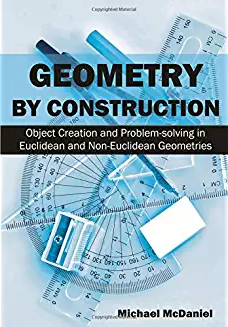 Dr. Mike McDaniel has written a book, Geometry by Construction: Object Creation and Problem-solving in Euclidean and Non-Euclidean
Geometries, which uses the results of his many successful undergraduate research projects at
Aquinas. Read more.
Dr. Mike McDaniel has written a book, Geometry by Construction: Object Creation and Problem-solving in Euclidean and Non-Euclidean
Geometries, which uses the results of his many successful undergraduate research projects at
Aquinas. Read more.
May 2024 - May 2025
Using VR to find conjectures in spherical geometry
Michael Vanderkolk
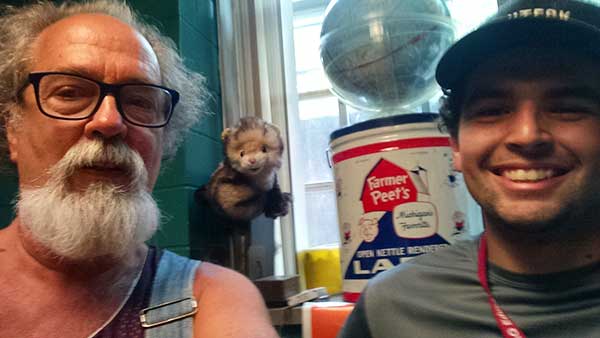 By modeling geometric ideas in spherical geometry using Blender to make meshes, animate
and render, we have already found new conjectures. Conjecture 1: the set of twelve
projection points and Wallace-Simson lines published previously occurs for the most
general case of one single projection point with a Wallace-Simson line. Conjecture
2: A subset of Wallace-Simson lines and lines of projections and feet of projections
and points of projection form a natural 12-point, 12-line Projective Geometry. (This
would be news because the 12 point Projective Geometry has been proved to exist but
no actual example of one has been found.) Conjecture 3: A subset of projection points,
feet of projections, etc forms a 7 point Projective Geometry isomorphic to the Fano
Plane. Our Blender examples have already bloomed into very interesting spherical models.
One modification uses collars, like Saturnian rings, which stick out from the sphere
for spherical great circles. We can modify how far the collars stick out to emphasize
importance. Since we intended to fit as much information into the mesh as we could,
having a new way to see our ideas, a way completely impossible in 2-D, shows immediate
promise. Next we will work on creating animations to illustrate the complicated ideas
we are exploring.
By modeling geometric ideas in spherical geometry using Blender to make meshes, animate
and render, we have already found new conjectures. Conjecture 1: the set of twelve
projection points and Wallace-Simson lines published previously occurs for the most
general case of one single projection point with a Wallace-Simson line. Conjecture
2: A subset of Wallace-Simson lines and lines of projections and feet of projections
and points of projection form a natural 12-point, 12-line Projective Geometry. (This
would be news because the 12 point Projective Geometry has been proved to exist but
no actual example of one has been found.) Conjecture 3: A subset of projection points,
feet of projections, etc forms a 7 point Projective Geometry isomorphic to the Fano
Plane. Our Blender examples have already bloomed into very interesting spherical models.
One modification uses collars, like Saturnian rings, which stick out from the sphere
for spherical great circles. We can modify how far the collars stick out to emphasize
importance. Since we intended to fit as much information into the mesh as we could,
having a new way to see our ideas, a way completely impossible in 2-D, shows immediate
promise. Next we will work on creating animations to illustrate the complicated ideas
we are exploring.
Faculty Advisor: Dr. Michael McDaniel, Mathematics
Funded by: Mohler-Thompson Summer Research Grant
Rebecca Beltran
Faculty Advisor: Dr. Mike McDaniel
Fundamental Theorem of Elliptic Wallace-Simson Lines
Mohler-Thompson Summer Research Program
When a point projected onto the sides of a triangle has collinear feet, the line is called a Wallace-Simson line. Given a projection point F and its Wallace-Simson line J on non-self-polar triangle ABC, we prove the existence of another projection point G and Wallace-Simson line K such that the polars of F and G serve as Wallace-Simson lines for triangle ABC and its polar triangle. Also, the poles of J and K serve as projection points with Wallace-Simson lines for both triangles.
Edin Mehanovic
Faculty Advisor: Dr. Joe Spencer
An Investigation of Stone Movement in Mancala
Mohler-Thompson Summer Research Program
Using the Mancala sowing mechanism on a finite number of stones in an infinitely long row of pits, we will explore what patterns arise for the arrangement of stones. Additionally, we will explore how to efficiently move a select number of special stones along a row of pits that each contain a set number of stones.
May 2023 - May 2024
Efficient Movement with the Mancala Mechanism 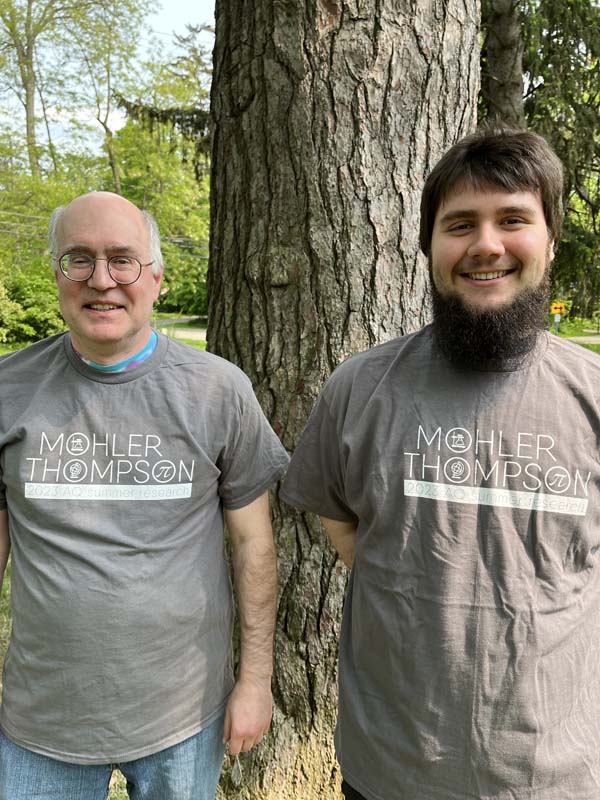 Edin Mehanovic
Edin Mehanovic
We will explore various problems involving the Mancala mechanism. These will include finding bounds for efficient movement of stones and variations on the puzzle Tchoukaillon. (read more)
Faculty Advisor: Dr. Joseph Spencer, Mathematics
Funded by: Mohler-Thompson Summer Research Grant
Properties of elliptic Wallace-Simson lines and applications in three dimensions.
Rebecca Beltran
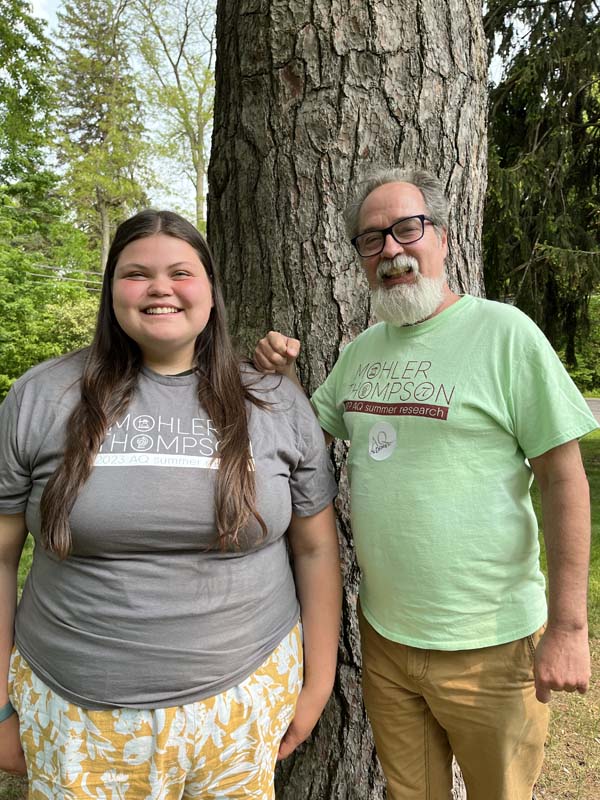 All the elliptic geometry developments done through Mohler-Thompson since 2018 have
applications in three dimensions. We plan to model with VR in Blender to create animations
to illustrate our ideas. We also plan to develop double and triple integral formulas
based on our geometry.
All the elliptic geometry developments done through Mohler-Thompson since 2018 have
applications in three dimensions. We plan to model with VR in Blender to create animations
to illustrate our ideas. We also plan to develop double and triple integral formulas
based on our geometry.
Faculty Advisor: Dr. Michael McDaniel, Mathematics
Funded by: Mohler-Thompson Summer Research Grant
Nicole Gregory
Faculty Advisor: Dr. Shari McCarty
Program Evaluation for Mathematics Education - Secondary Teacher Preparation at Aquinas
College
This program evaluation investigated the strengths and weaknesses of Aquinas College’s current Mathematics program with respect to secondary education and teacher preparation. The researchers studied the traits of well-qualified teachers and developed program suggestions that would blend teacher preparation with the existing traditional math content in the major.
Kate Kramm
Faculty Advisor: Dr. Joseph Fox and Dr. Kevin Boyd
Using Calculus to Analyze Chemical Kinetics
The acid-catalyzed hydrolysis of sucrose is nearly a unimolecular reaction, meaning the reaction solely depends on the concentration of sucrose. The data obtained from this reaction is based on the use of polarimeters. This instrument utilizes a polarized light and the angle of its rotation in order to determine concentration of a substance. In this case, the measurement was determining the amount of sucrose remaining as it decomposed into fructose and lactose. The kinetic data obtained in this format is represented as integrated data because the measurement is written as concentration in relation to time. From this, the use of calculus techniques can be used to analyze the data obtained through polarimetry in order to determine the rate constant and order of the reaction from the rate law.
May 2022 - May 2023
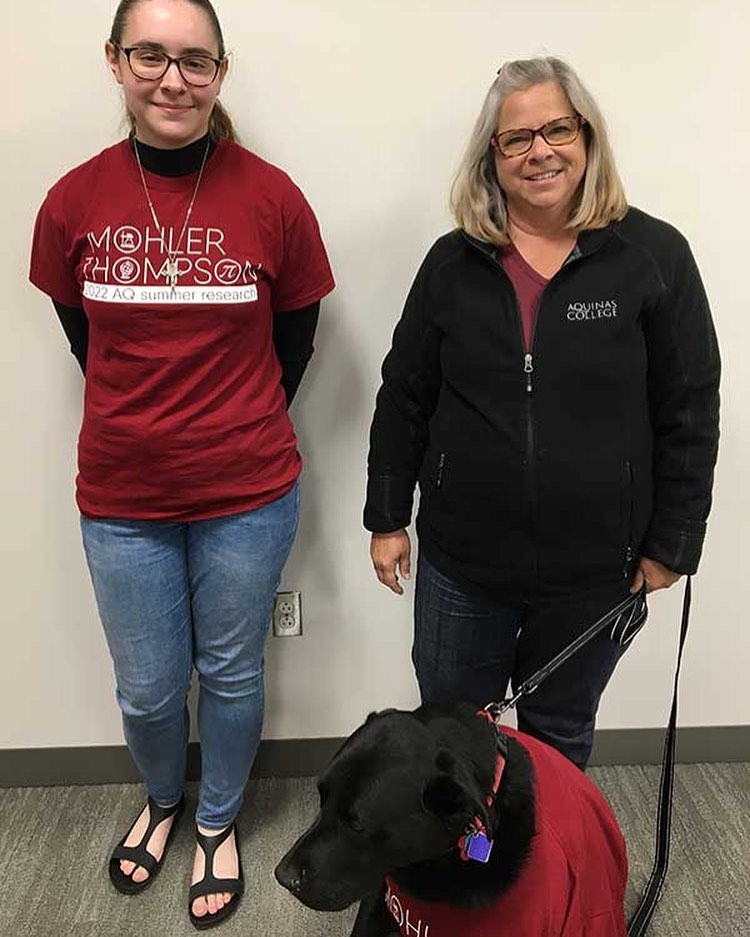
Evaluating Secondary Mathematics Teacher Preparation at Aquinas College
Nicole Gregory
The project will evaluate what it means to mesh content knowledge and pedagogical
content knowledge together within a traditional mathematics major at Aquinas College.
To thoroughly prepare future teachers, we aim to keep in mind the mathematical content
(general mathematics program), the pedagogical content (courses within the School
of Education), and how to develop touch-points for pedagogical content knowledge.
All experiences need to blend together to fully prepare future teachers for the Michigan
Test for Teacher Certification (MTTC) and overall readiness to teach in the classroom.
Through the lens of how to best prepare future teachers for their classrooms, this
project will design teacher-preparation specific language for traditional math major
course descriptions and syllabi, design multiple experiential learning opportunities
in clinical settings, and design opportunities for assessment of key skills throughout
the program.
We will conduct a series of interviews with data science practitioners, specifically those who regularly use the statistical programming language R, to gain insights about the skills that are considered valuable in the professional data analytics community. We will use these insights to rework the course MS 282 (Applied Statistics with R), which is a foundational course in the Data Analytics major, making it into a completely project-based experience. This revamping will consist of writing and testing a series of projects based on industry-provided datasets.
Funded by: Aquinas College Summer Scholars Program
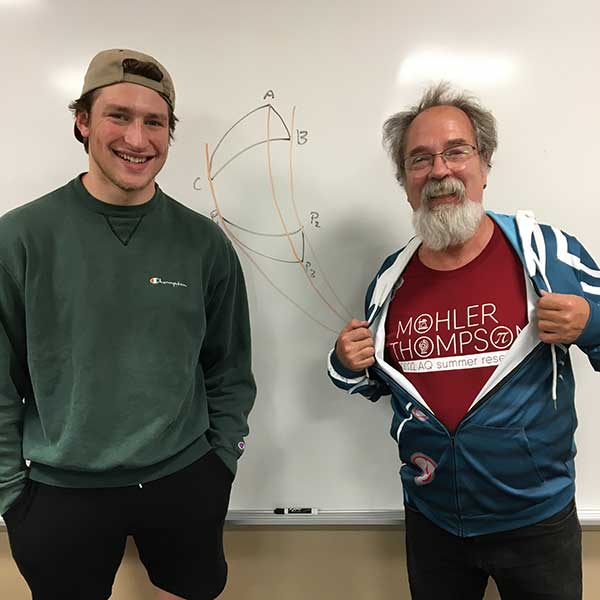
A Plethora of Wallace-Simson Lines
Jarrad Epkey
The Wallace-Simson theorem in elliptic geometry is completely different from the Euclidean
version, which was completely defined in 1797. Building on previous summer work, we
are finding many projection points for Wallace-Simson lines. We can prove some are
non-constructible. We hope to find ways to count and construct projection points and
to see how these projection points and Wallace-Simson lines interact with other properties
of elliptic triangles.
May 2021 - May 2022
Computing Group Representation Using SAGE
Shekira Edgar
A group is a mathematical structure that encodes symmetry, and a representation of a group is a way to realize what those symmetries are using the language and techniques of linear algebra. This project will analyze the representations of certain groups known as the classical groups, which are groups of matrices. Our problem can be approached from an elementary point of view, and most of our work will be devoted to automating the necessary calculations by writing short computer scripts.
Faculty Advisor: Dr. Joe Fox, Mathematics
Funded by: Mohler-Thompson Summer Research Grant
Elliptic Geometry Applied to Biochemistry and Geospatial Analysis
Noelle Kaminski
We are building on the last three years of Mohler-Thompson summer research. We have new math results which could have consequences beyond geometry. For instance, the icosahedral viral capsid has projection lines with collinear feet in important places. Also, satellite orbits fit elliptic geometry very nicely. Can we say anything new? We're going to try.
Faculty Advisor: Dr. Michael McDaniel, Mathematics
Funded by: Mohler-Thompson Summer Research Grant
May 2020 - May 2021
Elliptic geometry applied to icosahedral capsids.
Joshua Wierenga
Dr. David Wilson's 2016 result that, for viruses with icosahedral shapes, viral probes lie on icosahedral great circles inspires us to seek further structures through geometry and bio-chemistry. We will study his paper and its references along with articles on the geometry of the icosahedral sphere. We plan to build physical models using Zometool and virtual models in SketchPad. We aim to find a few properties which are new to Dr. Wilson and send our findings to him for verification.
Faculty Advisor: Dr. Michael McDaniel, Mathematics
Funded by: Mohler-Thompson Summer Research Grant
Tchoukaillon Crossings
Thomas Siebelink
Tchoukaillon is a solitaire game that uses the sowing mechanism from game Mancala. Tchoukaillon’s board consists of a single row of bins. The goal is to sow all stones off the board to an end bin, called the Ruma, with the requirement that each sow ends in the Ruma. It is known for what arrangements of stones that Tchoukaillon can be won using a fairly simple strategy. We will study winning strategies when there are multiple rows to sow from and the rows cross at some bins or bins.
Faculty Advisor: Dr. Joseph Spencer, Mathematics
Funded by: Mohler-Thompson Summer Research Grant
May 2019 - May 2020
Monsky's Theorem and the Wallace-Simson Line in Non-Euclidean Geometry
Morgan Nissen
We will seek other counter-examples to Monsky's Theorem in hyperbolic geometry and we will seek the set of points from which an elliptic triangle has Wallace-Simson lines.
Faculty Advisor: Dr. Michael McDaniel, Mathematics
Funded by: Mohler-Thompson Summer Research Grant
The Mathematics of Machine Learning Algorithms
Anna Putnam
We are creating, from scratch, an image recognition program using neural networks, basic programming, and calculus concepts. Our goal is to have a working program that can label images of oak leaves and maple leaves accurately, through exploring the mathematics of machine learning.
Faculty Advisor: Dr. Joe Fox, Mathematics
Funded by: Mohler-Thompson Summer Research Grant
May 2018 - May 2019
Acyclic orderings in citation networks
Aimee Judd
Citation networks are large collections of objects, some of which refer to others. For example, one might consider a collection of Supreme Court decisions, some of which cite others as precedents. In this project, we will develop a method to count all possible orderings of the objects in a citation network that preserve the citation structure.
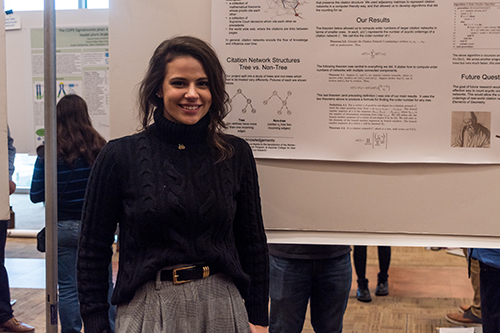
Faculity Advisor: Dr. Joe Fox, Mathematics
Funded by: Mohler-Thompson Summer Research Grant
Monsky's Theorem and Pedal Triangles in Non-Euclidean Geometry
Kelsey Hall
We will calculate examples to show how Monsky's Theorem fails to be true in non-Euclidean geometry. We will seek theorems for pedal triangles in non-Euclidean geometry.
Faculty Advisor: Dr. Michael McDaniel, Mathematics
Fund by: Mohler-Thompson Summer Research Grant
May 2017 - May 2018
Efficient Mancala Movement
Holly Ensley
This project investigates the mechanism of movement used in the game mancala. We are interested in how we can most efficiently move particular stones, or kings, over long distances. We will explore cases with different numbers of kings and starting stones. Through this, we are hoping to find a bounds for measurements of efficient movement.
Faculty Advisor: Dr. Joseph Spencer, Mathematics
Funded by: Mohler-Thompson Summer Research Grant
Hyperbolic versions of Euclidean theorems
Paul Gass
Napoleon, Pascal, Brianchon, Miquel, and many other geometers have theorems bearing their names. Some of these theorems hold in hyperbolic geometry, some fail and some require further investigation. We hope to add a few new hyperbolic versions of these named theorems.
Faculty Advisor: Dr. Michael McDaniel, Mathematics
Funded by: Mohler-Thompson Summer Research Grant
May 2016 - May 2017
Hyperbolic Quadratures
Tristen Spencer
Previous M-T researchers have squared the circle in non-Euclidean spaces. This opens
the door to explore other hyperbolic cases of areas of circular regions that match
areas of polygonal regions. We hope to show the five Euclidean quadratures fail and
discover new hyperbolic quadratures which would be impossible in Euclidean space.
Faculty Advisor: Dr. Michael McDaniel, Mathematics
Funded by: Mohler-Thompson Summer Research Grant
Investigating Movement in Mancala
Maria Maguire
This project investigates the mechanism of movement used in the game mancala. We are interested in how we can most efficiently move particular stones, or kings, over long distances. We will explore cases with different numbers of kings and starting stones. Through this, we are hoping to find a pattern of most efficient movement.
Faculty Advisor: Dr. Joseph Spencer, Mathematics
Funded by: Mohler-Thompson Summer Research Grant
May 2015 - May 2016
Jacob Campbell and Dr. Fox researched the properties of circulant graphs, including their independence numbers.
Cecilia Magnuson and Dr. McCarty researched higher-order thinking in middle school mathematics classrooms.
May 2014 - May 2015
Krystin Dreyer and Dr. Fox studied the mathematics of citation networks.
Kyle Jansens and Dr. McDaniel completed the long story of squaring the circle. It’s been known since 1882 that in Euclidean geometry, it’s impossible to construct, using only a straightedge and compass, a square with the same area as a given circle. In 2012, Noah Davis and Dr. McDaniel proved that such a construction is possible in hyperbolic geometry, and Kyle and Dr. McDaniel proved it’s also possible in elliptic geometry. Their result was published in the Rose-Hulman Undergraduate Math Journal, and Kyle, co-author Noah Davis, and Dr. McDaniel even made the local news! Read Kyle’s and Noah’s paper here.
May 2013 - May 2014
Noah Armstrong and Dr. Spencer studied the mathematics of the game Mancala.
Noah Davis and Dr. McDaniel proved that it’s possible to square the circle in hyperbolic geometry. Noah presented his results at MathFest in Portland, Oregon, and his paper was published in Rose-Hulman Undergraduate Math Journal. Read Noah’s paper here.
May 2012 - May 2013
Jackie Gipe and Dr. McDaniel worked on a project titled, “Invertible Chord Diagrams from the Wheel.” Jackie presented her work at a Calvin College colloquium.
“Alhazen’s hyperbolic billiard problem”, by Nate Poirier. Appeared in Involve, Vol. 5, No. 3, 2012. Read it here.